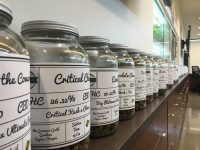Dalwhinnie Enterprises is a cannabis brand that started in Ridgeway, Colorado. Based in the San Juan Mountains in Western Colorado, the company includes brands like Dalwhinnie Farms Cannabis, Shift Cannabis, Ridgway Hemp Company and the Dalwhinnie Farms Boutique in Aspen, Colorado.
Brandon Barksdale has about a decade of experience in cannabis. He has worked for small startups and large multi-state operators. Most recently, he has worked with CohnReznick’s Advisory Practice. At CohnReznick, he worked alongside the Dalwhinnie team, helping them launch their boutique in Aspen. Since joining the team as their new CEO, Barksdale has shifted his focus to expansion, scalability and operational excellence, using things like GMPs and other certifications to improve quality and consistency.
We caught up with Barksdale to learn about his experience, his new role, entrepreneurship, social equity and what it means to be a minority leader in the cannabis space.
Cannabis Industry Journal: You have an impressive background before joining the cannabis industry full time. What made you take the leap into this space? Tell us about your background.
Brandon Barksdale: The majority of my background is driven around transforming businesses cross functionally, specifically in operations and finance. When it comes to the cannabis industry, it still lacks maturity; so being able to apply key performance indicators, benchmarking, controls and analytics can drive the industry, and more specifically, our organization, to operational excellence.

While I was in the professional service space, I was an advisory leader within our cannabis industry group. I was able to be involved and work with organizations at differing levels of maturity, guiding corporate strategy and functional and operational improvement before fully jumping in to lead this organization. Dalwhinnie was the perfect opportunity to use my previous experience to instill value to the company as it continues to scale and grow.
CIJ: With a such a big portfolio of cannabis clients, why leave all that behind to take the reins at Dalwhinnie?
Barksdale: Simply put, I was eager to roll up my sleeves and drive a single organization through its growth lifecycle. When you’re working with and cycling through multiple clients, you’re supporting them from a strategic perspective and providing value and direction but the execution is left to the operational teams internally to follow through. No matter how detailed the plan or deeply you are involved you are still third-party. During scope changes and ramping up and down there’s always some momentum that gets lost. I want to focus on one company, to really tie myself to its DNA, so that I can better be in the driving seat toward success and operational excellence.
Dalwhinnie stands out because of their unwavering focus on quality and the integrity of the brand. To that end, I want everyone within the organization to succeed and to nurture a healthy company ecosystem that allows for professional development, training and being an industry leader. We have a really big opportunity here to set the standard for what quality looks like going forward and what it means to really care about the product that you’re putting out into the marketplace.
CIJ: Dalwhinnie Farms has a cool location in Ridgway, Colorado at the base of the San Juan Mountains and sustained by the snowmelt from the Uncompahgre River. How does this make Dalwhinnie cannabis different?
Barksdale: There is no doubt that growing at a high elevation with different seasonalities is a challenge. However, every region on Earth presents its own benefits and challenges as it relates to cultivation. You can use the comparison to different regions of wines. Wine from Bordeaux and wine from Napa are going to have different profiles because of all the unique factors of climate, water, humidity, aging practices, etc.

This is one of the things that will make the future of cannabis very interesting. There are multiple elements and variables that help tell the story of the product through its experience of growth. Just like there are tons of wine regions and varietals, there are hundreds of cannabis strains and exponentially more crosses where one can discuss multiple facets of what makes that particular product unique. It is one of the things that will continue to evolve in the cannabis market and one of the most exciting components—knowing that we are still on the way to creating a unique and original marketplace!
CIJ: The Dalwhinnie Farms retail store in Aspen is a unique cannabis dispensary. What is the retail strategy moving forward?
Barskdale: Every cannabis wholesaler, and most markets, are feeling the pressure of price volatility and retail is one of the best-known ways to help stabilize an organization. Our strategy is to stay as nimble and creative as we can, focusing on continuing to build out the success of our flagship Aspen dispensary as well as partnering and entertaining retail expansion opportunities. Our strategy is not to ignore that fact, but to act as perceptively as we can to broaden our retail footprint.

CIJ: Tell us about your short-term goals for Dalwhinnie.
Barksdale: When I came onboard with Dalwhinnie, I hit the ground running. I had some history with Dalwhinnie and the family of companies so I was lucky to have a head start and insight toward necessary changes. Short term goals included attention to production expansion initiatives, operational changes that moved us closer to excellence, and fine-tuning our GMPs. My eye is also focused on company culture, performance management, and constantly pushing the envelope on quality. While always of importance, we want to continue as a pioneer on cultivation and manufacturing standards as it relates to quality in organics.
CIJ: And what are your long-term goals for the company?
Barksdale: Mentioned as a short-term goal, I want to move toward GMP and GACP manufacturing standards and create a continual cycle of improvement as we move through our expansion and growth plans. In the future, multi-state operations and partnerships are also a big part of our strategic direction. We aim to continue to provide an elevated cannabis retail experience at our flagship location and to expand our retail footprint in the marketplace.
CIJ: There’s been a focus on racial disparities in the cannabis space and the need to improve social equity and opportunities for minorities. How do you hope to support equity and help drive change?
Barksdale: We are at a turning point in the industry where substances are becoming legal, yet so many people are still suffering from nonviolent, non-serious offenses related to cannabis. It is unavoidably apparent and it is something that deserves significant attention and commitment. Every company that is operating in this space should take a level of responsibility to help address or support reparations in some fashion whether that be through jobs, access, and/or partnerships.
 There should be an obligation to support some type of social equity improvement project as it relates to the cannabis industry. Some legacy states and now new states coming online, are attempting to course correct by making it a part of the compliance or access components for licenses.
There should be an obligation to support some type of social equity improvement project as it relates to the cannabis industry. Some legacy states and now new states coming online, are attempting to course correct by making it a part of the compliance or access components for licenses.
There is still a lot of work to be done. I am working through the strategies that work for us as a company. I am actively exploring how to incorporate opportunities into our operating and business model.
As a women-owned company and myself being a minority leader, it is on the forefront of our priority list to come up with a comprehensive plan and commitment to supporting social and equities in this space.









